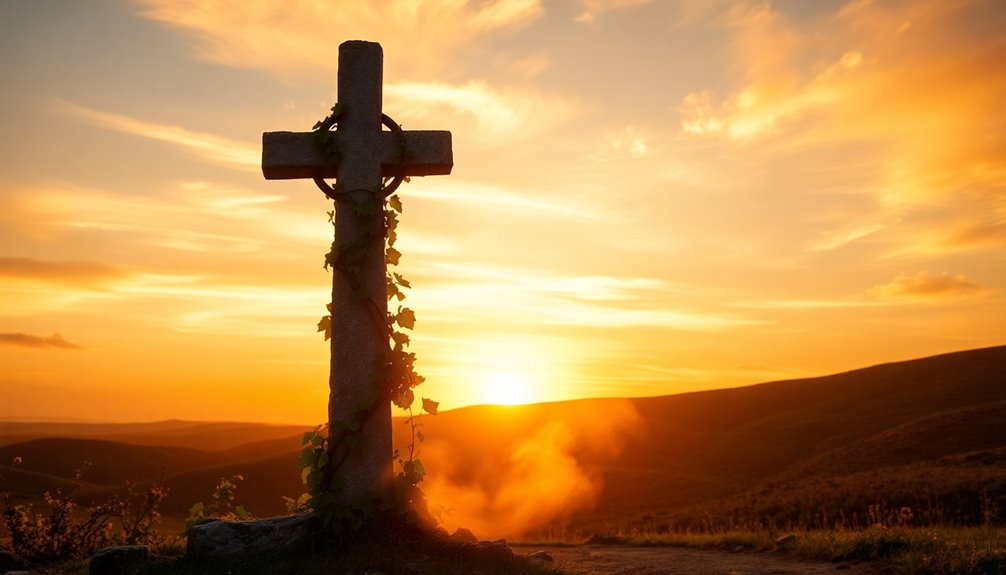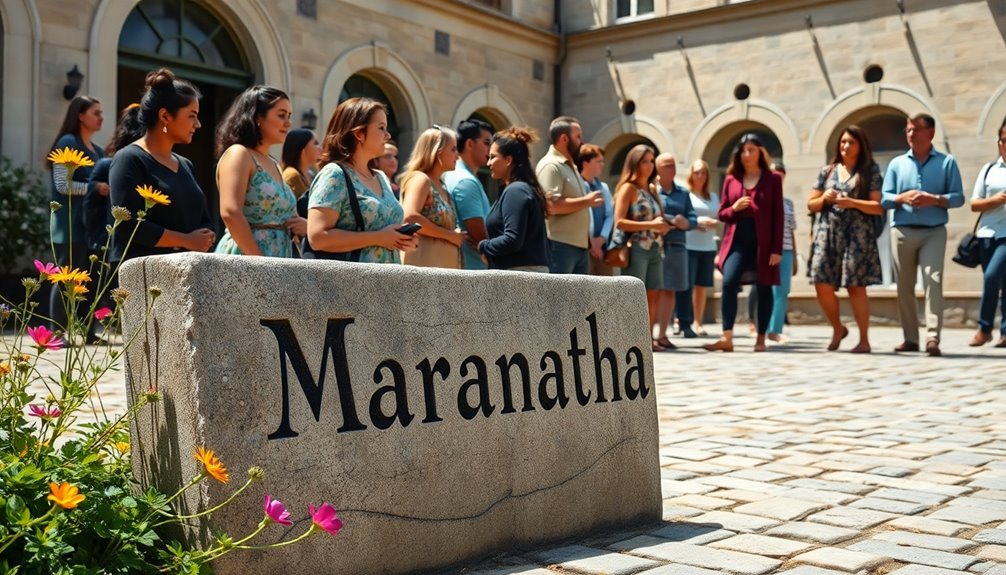"Maranatha" is an Aramaic phrase that translates to "Our Lord comes" or "O Lord, come." It reflects a powerful yearning for Christ's return, deeply rooted in Christian faith. This term's significance extends beyond a simple plea; it serves as a reminder for believers to live in readiness and spiritual vigilance. Found in 1 Corinthians 16:22, "Maranatha" was a watchword for early Christians facing persecution, embodying hope amid trials. When you embrace this phrase, you connect with a rich history of faith. There's much more to uncover about its impact on worship and community life.
Key Takeaways
- "Maranatha" is an Aramaic phrase meaning "Our Lord comes" or "O Lord, come!" reflecting anticipation for Christ's return.
- It signifies both hope for Jesus' future return and acknowledgment of His past coming, enriching Christian faith.
- The term is found in 1 Corinthians 16:22, expressing longing and readiness for divine intervention.
- Used by early Christians during persecution, it became a distinct identifier and symbol of faith and unity.
- Reciting "Maranatha" in prayer fosters spiritual connection and encourages believers to live with an eternal perspective.
Introduction

Maranatha is a powerful term that carries deep significance for many Christians. Derived from Aramaic, it means "Our Lord comes" or "O Lord, come!" This phrase encapsulates a profound anticipation for the return of the Lord Jesus Christ. It appears in the New Testament, specifically in 1 Corinthians 16:22, where it serves as a solemn reminder of the hope Christians hold for Christ's Second Coming.
Early Christians often used Maranatha as a watchword during times of persecution, reflecting both urgency and hope. In facing trials, they called upon the Lord Jesus Christ with this term, expressing their longing for divine presence and intervention.
This sense of anticipation isn't just historical; it resonates deeply with contemporary believers as well. For you, Maranatha is a call to focus on spiritual matters and live in expectation of Jesus' return. It encourages you to maintain a hopeful outlook and to remember the urgency of your faith.
Scriptural Insights on Maranatha

When you explore the scriptural insights on Maranatha, you'll find it prominently mentioned in 1 Corinthians 16:22, emphasizing the longing for Christ's return.
This anticipation is echoed in Revelation 22:20, where Jesus reassures believers of His swift coming.
Together, these verses frame Maranatha within a broader context of hope, readiness, and community faith amid challenges.
Primary Bible References
The term "Maranatha" carries significant weight in Scripture, especially in its expressions of longing for Christ's return. Found in 1 Corinthians 16:22, it translates to "Our Lord, come!" or "Come, O Lord," reflecting the deep anticipation of His return.
This longing is echoed in Revelation 22:20, where Jesus promises, "Surely I come quickly," reinforcing the urgency of the message that the Lord is coming.
In Philippians 4:5, the phrase serves as a reminder of the Lord's closeness, urging you to remain aware of His presence and imminent return.
James 5:8-9 further encourages believers to be patient and steadfast, as the coming of the Lord is near, aligning with the sense of urgency encapsulated in "Maranatha."
Additionally, in 1 Corinthians 16:22, the connection between "Maranatha" and anathema emphasizes the importance of loving Jesus.
It highlights the consequences for those who don't embrace this longing. By understanding these primary biblical references, you deepen your appreciation for the profound hope and urgency that "Maranatha" represents in the Christian faith.
Secondary Bible References
In various secondary references throughout the Bible, the essence of "Maranatha" shines through, enriching our understanding of its significance. This Aramaic phrase, meaning "Come, Lord," appears in 1 Corinthians 16:22, where it serves as a poignant reminder of the anticipation of Christ's return, emphasizing the urgency of love for Him.
Similarly, Philippians 4:5 highlights the Lord's nearness, encouraging you to live in a state of readiness for His coming.
James 5:8-9 reinforces this theme by urging patience and steadfastness in faith, echoing the sentiment of Maranatha and reminding you that the Lord's return is imminent.
In Revelation 22:20, the phrase resonates again, as Jesus proclaims, "Surely I come quickly," reiterating the expectation of His swift return to fulfill His promises.
Furthermore, the connection between Maranatha and anathema in 1 Corinthians 16:22 underscores a dual theme: hope for believers and a stark warning for those who reject Christ.
These secondary references not only deepen your appreciation for the term but also inspire you to live with an eager anticipation of His return.
Early Christian Worship Practices

Early Christian worship practices were marked by a deep sense of anticipation and community. Central to these gatherings was the term "Maranatha," which served as a solemn watchword among believers. This phrase emphasized their collective hope and readiness for Christ's return, creating a profound connection among worshippers.
During services, "Maranatha" often found its place in liturgical contexts, serving as an invocation for divine presence and intervention.
As Christians faced persecution, invoking "Maranatha" became a significant expression of their faith. It replaced traditional Jewish greetings like "shalom," illustrating a distinct identity rooted in their shared belief in Jesus as Lord. By using "Maranatha," congregants reinforced their eschatological expectations, reminding one another of the promise of Christ's second coming.
This practice not only fostered community but also cultivated a sense of urgency in their faith. Each utterance of "Maranatha" echoed their longing for divine assistance and a reminder of the hope that united them.
Through these early worship practices, believers established a rhythm of anticipation that echoed through generations, solidifying their commitment to live in readiness for what was to come.
Historical Context of Maranatha

Maranatha emerged during a tumultuous period for early Christians, characterized by severe persecution under Roman rule. This term quickly replaced the Jewish greeting "shalom," becoming a powerful expression of faith in the Lord's imminent return. For early Christians, Maranatha wasn't just a word; it was a declaration of identity and hope. It served as a secret password among believers, helping to protect them against persecution from both Jews and Romans.
In the face of danger, Maranatha became a solemn reminder of their eschatological hope. It emphasized the urgency of living in anticipation of Christ's return, urging you and your fellow believers to remain ready and faithful amid trials. The early church's communal longing for Jesus was palpable, and invoking Maranatha reinforced the significance of expectation during uncertain times.
Historical accounts show that Maranatha was commonly used in liturgical practices, reminding early Christians of their shared faith and the hope that sustained them. This term encapsulated their struggles and aspirations, fostering a sense of unity and resilience as they navigated a world fraught with challenges.
Misunderstanding Its Cultural Significance

You might think "Maranatha" is just a simple prayer for Christ's return, but its meaning runs much deeper.
Many overlook its historical role as a secret identifier among early Christians, which adds layers to its cultural significance.
Debunk Common Misconceptions
Amidst the rich tapestry of early Christian language, "Maranatha" often gets misunderstood as merely a cry for Christ's return. While it does express longing for His coming, it also acknowledges His historical presence as Lord. This duality is rooted in its Aramaic origins, where the term served as more than just a hopeful plea; it functioned as a secret password among early Christians facing persecution.
Many overlook this cultural significance, reducing "Maranatha" to a simplistic interpretation. Some people interpret it as an urgent call for divine intervention, while others celebrate Jesus' past life and sacrifice. Each perspective reveals rich theological implications tied to communal identity.
Furthermore, the connection to the Greek word "anathema" in 1 Corinthians 16:22 highlights the urgency of love for Christ within early Christian communities. Misunderstanding the context can lead you to miss the deeper emotional and communal ties that "Maranatha" fosters among believers.
Embracing its full meaning encourages a more profound appreciation for the early church's experience and the term's lasting impact on Christian faith.
Cultural Misinterpretations of Maranatha
Misunderstanding the cultural significance of "Maranatha" can lead to a shallow appreciation of its role in early Christianity. Often, people interpret this Aramaic term as just a plea for Christ's return, overlooking its historical context as a powerful declaration of faith among persecuted believers.
This reduction limits your understanding of its deeper implications, which include themes of judgment and readiness vital to early Christians.
Many contemporary uses of "Maranatha" fail to capture its original weight, transforming it into a generic expression of hope. The phrase's dual meanings—"Our Lord, come!" and "Our Lord has come!"—are frequently simplified, missing the theological richness they convey about Christ's presence.
These misunderstandings ignore how "Maranatha" served as a solemn watchword within early Christian communities, emphasizing urgency and collective anticipation.
Daily Devotional Practices

Incorporating "Maranatha" into your daily routine can serve as a powerful reminder of hope, keeping your focus on Christ's promise to return.
You might find that using it in congregational prayer gatherings strengthens your community's anticipation and faith.
Daily Reminders of Hope
Often, using the term "Maranatha" in your daily devotional practices can serve as a powerful reminder of hope and anticipation for Christ's return. By regularly reciting "Maranatha," you create a mantra that helps you focus during contemplative prayer. This practice deepens your spiritual connection and reinforces the promise of Jesus' imminent return, turning your thoughts toward divine intervention in daily life.
Engaging with the phrase through scripture reading, particularly 1 Corinthians 16:22, strengthens your understanding of living in expectation. Reflecting on "Maranatha" encourages you to evaluate your daily actions and motivations, ensuring they align with your faith and readiness for life's challenges.
Incorporating "Maranatha" into your routine not only nurtures your personal hope but can also enhance your connections with others. Sharing this term in communal worship fosters a collective longing for Christ's return, creating a supportive environment where believers uplift each other.
Ultimately, these daily reminders of hope help you maintain an eternal perspective, encouraging you to live with purpose and urgency as you await the fulfillment of God's promises.
Congregational Prayer Gatherings
Ultimately, congregational prayer gatherings provide a vital opportunity to strengthen your faith and share in the anticipation of Christ's return,
reminding you that you're part of a larger community united in hope.
Final Thoughts on Maranatha

Maranatha captures the essence of Christian hope and anticipation, serving as a powerful reminder of the promise of Christ's return. This Aramaic term, meaning "Our Lord comes" or "Come, O Lord," emphasizes a longing deeply rooted in the Christian faith. In 1 Corinthians 16:22, it stands out as a significant invocation, highlighting its importance in early Christian worship.
During times of persecution, early Christians used Maranatha as a watchword, symbolizing their collective hope for divine intervention. This powerful phrase not only reflects a plea for Christ's return but also affirms His past coming, enriching its theological significance. It's a dual reminder that inspires you to live in readiness and anticipation.
Today, Maranatha continues to resonate within the hearts of believers, urging you to maintain faith and perseverance. It serves as a rallying cry, reminding you that while life may present challenges, the promise of Christ's return is always near.
Embracing Maranatha can transform your outlook, encouraging you to stay connected to your faith and fostering a deeper relationship with O Lord. Let this term inspire you as you navigate your spiritual journey.
Additional Resources

Exploring additional resources can enhance your understanding of Maranatha and its significance in Christian faith. To dive deeper, consider engaging in a Bible study focused on the New Testament, where Maranatha first appears in 1 Corinthians 16:22. This passage not only highlights the anticipation of the Lord's return but also serves as a powerful reminder of the hope early Christians held during times of persecution.
You can find various translations of the Bible that reflect the meaning of Maranatha. The New Revised Standard Version interprets it as "Our Lord, come!" while the New International Version phrases it as "Come, O Lord." These differences can enrich your understanding of the term and its context.
Additionally, look for commentaries or theological resources that discuss Maranatha's historical usage and its relevance today. Many contemporary Christian communities continue to emphasize the phrase, encouraging believers to live with the expectation that the Lord has come and is coming again.
Frequently Asked Questions
What Does Maranatha Mean Biblically?
When you explore the biblical significance of the term, you'll find it encapsulates a deep longing for Christ's return.
In 1 Corinthians 16:22, it expresses a communal hope among believers, urging for divine intervention during challenging times.
The phrase reflects the urgency and consequences of one's faith, reminding you of the importance of staying steadfast in anticipation of Jesus' Second Coming, as highlighted in both early Christian liturgy and the Book of Revelation.
What Is the Symbol of Maranatha?
The symbol of Maranatha represents a profound anticipation and hope within the Christian faith.
When you think about Maranatha, you're reminded of the urgency to live in expectation of Christ's return. It serves as a call to remain vigilant and faithful, embodying the collective longing for divine intervention.
This powerful term also unites believers, encouraging you to foster a strong sense of community and shared identity in the face of challenges.
Why Say Maranatha?
Saying "Maranatha" reminds you of the hope and anticipation in your faith. It serves as a call for Christ's return, urging you to stay spiritually prepared.
By expressing this phrase, you connect with a rich history of believers who faced challenges, fostering unity and encouragement.
Reciting it can bring you mental peace and spiritual focus, reinforcing your expectations and deepening your devotion.
It's a powerful reminder of the ultimate victory in your life.
How Do You Say Maranatha in Hebrew?
To say "Maranatha" in Hebrew, you'd express a similar sentiment with "בוא אֲדוֹן" (Bo Adon), which means "Come, Lord."
This phrase captures the essence of longing for the Lord's presence. If you're looking to convey anticipation for divine arrival, this Hebrew expression reflects that heartfelt desire.
It's fascinating how these languages intertwine, showing a shared hope across cultures.










